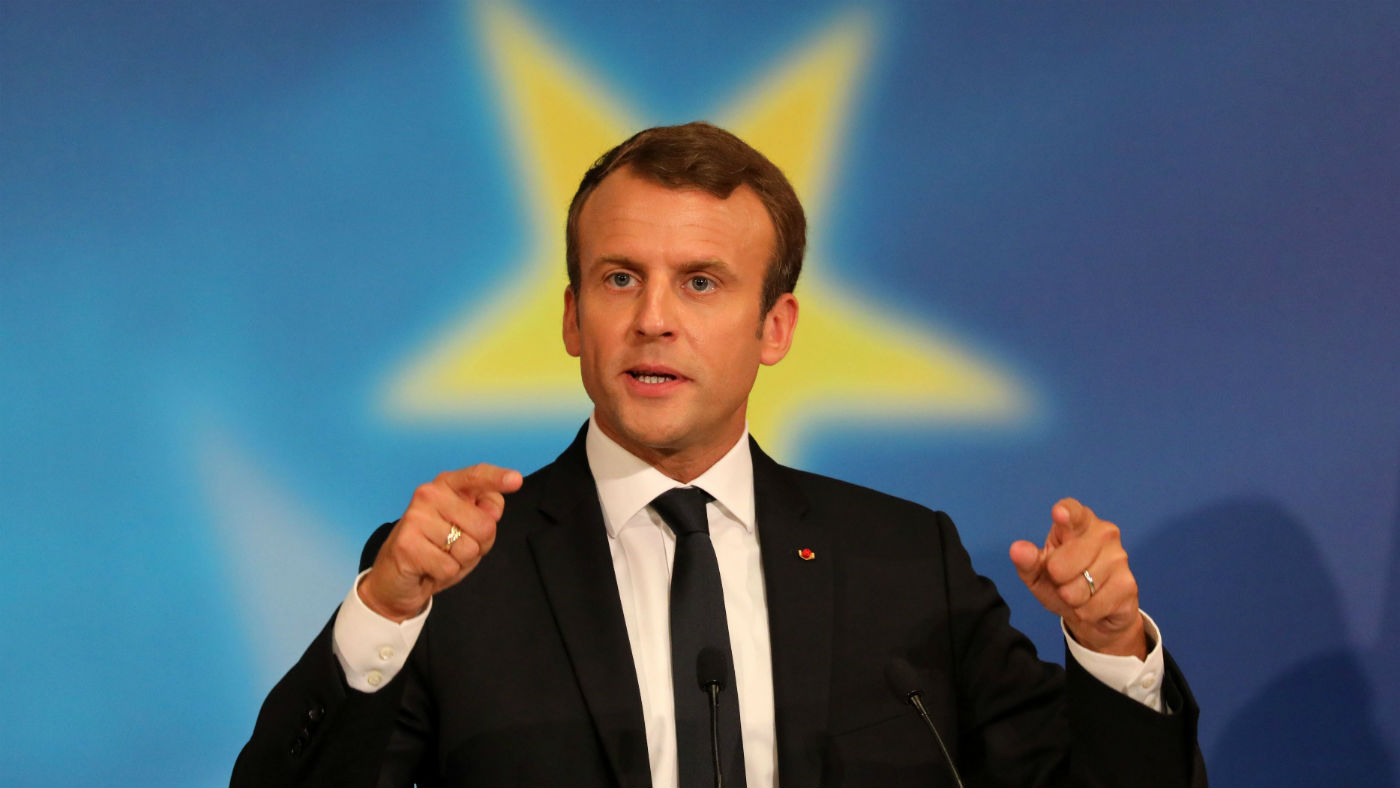Macron sets out radical vision for Europe
With Merkel seeking coalition partners, how many of French president's goals are achievable?

A free daily email with the biggest news stories of the day – and the best features from TheWeek.com
You are now subscribed
Your newsletter sign-up was successful
Emmanuel Macron has laid out an ambitious plan for an integrated Europe, calling for a single defence budget, an EU defence force and a shared budget for eurozone countries.
Speaking at the Sorbonne University in Paris, the French President laid out plans for EU identity cards, an EU-wide asylum agency to tackle migration, a European agency to deal with counter-terrorism and an aspiration for every child to speak at least two foreign EU languages by 2024.
He also backed EU taxes on big internet companies and international action to regulate online activity.
The Week
Escape your echo chamber. Get the facts behind the news, plus analysis from multiple perspectives.

Sign up for The Week's Free Newsletters
From our morning news briefing to a weekly Good News Newsletter, get the best of The Week delivered directly to your inbox.
From our morning news briefing to a weekly Good News Newsletter, get the best of The Week delivered directly to your inbox.
The Daily Telegraph reports Macron's suggestion that “Britain could return to a multi-speed European Union once it has undergone sweeping reforms”.
In a highly-anticipated and wide-ranging speech, the staunch Europhile said: “Europe as we know it is too weak, too slow and too inefficient. But only Europe can give us the means to act on the world stage as we tackle the great challenges of the day.
“What Europe is missing today is a common strategic culture... We need to trace the only path ensuring our future; it is the refoundation of a sovereign, united and democratic Europe.”
Macron, a centrist elected on a platform of strengthening the eurozone and promoting EU integration, has staked his political future on being able to draw EU countries together politically and economically.
A free daily email with the biggest news stories of the day – and the best features from TheWeek.com
But at a time when Europe is beset by tensions between east and west and battling to overcome nearly a decade of economic crisis, “Macron’s earnest and at times high-brow discourse ran the risk of falling on deaf ears,” says Reuters.
His plan may also be hindered by Germany’s recent general election, which left Chancellor Angela Merkel facing months of coalition negotiations.
Macron needs Germany’s backing for planned reform of defence, immigration and economic policy, “yet with Merkel weakened in Germany’s vote and her potential Free Democratic coalition partner even more hostile to aspects of euro-area integration than her own party, the prospect of radical change in Europe looks to have diminished”, says Bloomberg.
Perhaps acknowledging the problems he will have in selling greater European economic cooperation in Germany, “Macron was more restrained on the question of bolstering the eurozone, which had been billed as the centrepiece of his speech”, says the Financial Times.
He did take “an implicit swipe” at critics in Berlin who have opposed the idea of a significant eurozone budget because it would entail more risk sharing and fiscal transfers, the paper says, “but stopped short of laying out specific demand on the eurozone, only reiterating his wish for a common budget funded by corporate tax receipts and supervised by a finance minister”.
On Europe, Macron “is the anti-cynic”, says the BBC’s Paris correspondent Hugh Schofield, but the danger is that “by painting this new Europe in all its integrated glory, he is setting himself a challenge that is impossibly high”.
-
 Political cartoons for February 17
Political cartoons for February 17Cartoons Tuesday’s political cartoons include a refreshing spritz of Pam, winter events, and more
-
 Alexei Navalny and Russia’s history of poisonings
Alexei Navalny and Russia’s history of poisoningsThe Explainer ‘Precise’ and ‘deniable’, the Kremlin’s use of poison to silence critics has become a ’geopolitical signature flourish’
-
 Are Hollywood ‘showmances’ losing their shine?
Are Hollywood ‘showmances’ losing their shine?In The Spotlight Teasing real-life romance between movie leads is an old Tinseltown publicity trick but modern audiences may have had enough
-
 Epstein files topple law CEO, roil UK government
Epstein files topple law CEO, roil UK governmentSpeed Read Peter Mandelson, Britain’s former ambassador to the US, is caught up in the scandal
-
 Iran and US prepare to meet after skirmishes
Iran and US prepare to meet after skirmishesSpeed Read The incident comes amid heightened tensions in the Middle East
-
 Grok in the crosshairs as EU launches deepfake porn probe
Grok in the crosshairs as EU launches deepfake porn probeIN THE SPOTLIGHT The European Union has officially begun investigating Elon Musk’s proprietary AI, as regulators zero in on Grok’s porn problem and its impact continent-wide
-
 Israel retrieves final hostage’s body from Gaza
Israel retrieves final hostage’s body from GazaSpeed Read The 24-year-old police officer was killed during the initial Hamas attack
-
 China’s Xi targets top general in growing purge
China’s Xi targets top general in growing purgeSpeed Read Zhang Youxia is being investigated over ‘grave violations’ of the law
-
 Panama and Canada are negotiating over a crucial copper mine
Panama and Canada are negotiating over a crucial copper mineIn the Spotlight Panama is set to make a final decision on the mine this summer
-
 Europe moves troops to Greenland as Trump fixates
Europe moves troops to Greenland as Trump fixatesSpeed Read Foreign ministers of Greenland and Denmark met at the White House yesterday
-
 Why Greenland’s natural resources are nearly impossible to mine
Why Greenland’s natural resources are nearly impossible to mineThe Explainer The country’s natural landscape makes the task extremely difficult